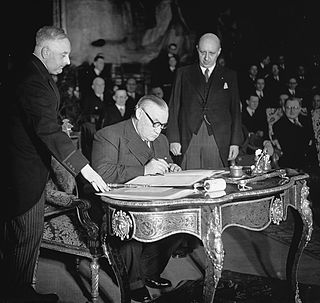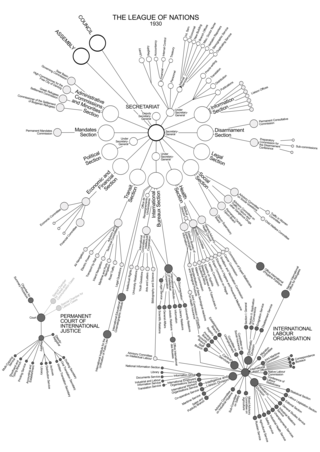Related Research Articles

The Benelux Union or Benelux is a politico-economic union and formal international intergovernmental cooperation of three neighbouring states in western Europe: Belgium, the Netherlands, and Luxembourg. The name is a portmanteau formed from joining the first few letters of each country's name and was first used to name the customs agreement that initiated the union. It is now used more generally to refer to the geographic, economic, and cultural grouping of the three countries.

The Vienna Convention on the Law of Treaties (VCLT) is an international agreement that regulates treaties among sovereign states; the VCLT is a codification of customary international law and state practice concerning treaties.

The Hague Conventions of 1899 and 1907 are a series of international treaties and declarations negotiated at two international peace conferences at The Hague in the Netherlands. Along with the Geneva Conventions, the Hague Conventions were among the first formal statements of the laws of war and war crimes in the body of secular international law. A third conference was planned for 1914 and later rescheduled for 1915, but it did not take place because of the start of World War I.
The Paris Convention for the Protection of Industrial Property, signed in Paris, France, on 20 March 1883, was one of the first intellectual property treaties. It established a Union for the protection of industrial property. The convention is still in force in 2023. The substantive provisions of the Convention fall into three main categories: national treatment, priority right and common rules.

The World Health Organization Framework Convention on Tobacco Control is a treaty adopted by the 56th World Health Assembly held in Geneva, Switzerland on 21 May 2003. It became the first World Health Organization treaty adopted under article 19 of the WHO constitution. The treaty came into force on 27 February 2005. It had been signed by 168 countries and is legally binding in 182 ratifying countries. There are currently 14 United Nations member states that are non-parties to the treaty.

A biological agent is a bacterium, virus, protozoan, parasite, fungus, or toxin that can be used purposefully as a weapon in bioterrorism or biological warfare (BW). In addition to these living or replicating pathogens, toxins and biotoxins are also included among the bio-agents. More than 1,200 different kinds of potentially weaponizable bio-agents have been described and studied to date.

The Treaty of Brussels, also referred to as the Brussels Pact, was the founding treaty of the Western Union (WU) between 1948 and 1954, when it was amended as the Modified Brussels Treaty (MTB) and served as the founding treaty of the Western European Union (WEU) until its termination in 2010. The treaty provided for the organisation of military, economic, social and cultural cooperation among member states as well as a mutual defence clause.

The Covenant of the League of Nations was the charter of the League of Nations. It was signed on 28 June 1919 as Part I of the Treaty of Versailles, and became effective together with the rest of the Treaty on 10 January 1920.

The year 1948 marked the beginning of the institutionalised modern European integration. With the start of the Cold War, the Treaty of Brussels was signed in 1948 establishing the Western Union (WU) as the first organisation. In the same year, the International Authority for the Ruhr and the Organization for European Economic Co-operation, the predecessor of the OECD, were also founded, followed in 1949 by the Council of Europe, and in 1951 by the European Coal and Steel Community, with the ensuing moves to create further communities leading to the Treaty of Rome (1957).

A sexually transmitted infection (STI), also referred to as a sexually transmitted disease (STD) and the older term venereal disease (VD), is an infection that is spread by sexual activity, especially vaginal intercourse, anal sex, oral sex, or sometimes manual sex. STIs often do not initially cause symptoms, which results in a risk of passing the infection on to others. Symptoms and signs of STIs may include vaginal discharge, penile discharge, ulcers on or around the genitals, and pelvic pain. Some STIs can cause infertility.
The International Vaccine Institute (IVI) is an independent, nonprofit, international organization founded on the belief that the health of children in developing countries can be dramatically improved by the use of new and improved vaccines. Working in collaboration with the international scientific community, public health organizations, governments, and industry, IVI is involved in all areas of the vaccine spectrum – from new vaccine design in the laboratory to vaccine development and evaluation in the field to facilitating sustainable introduction of vaccines in countries where they are most needed.

The League of Nations was established with three main constitutional organs: the Assembly; the Council; the Permanent Secretariat. The two essential wings of the League were the Permanent Court of International Justice and the International Labour Organization.

The Guatemala syphilis experiments were United States-led human experiments conducted in Guatemala from 1946 to 1948. The experiments were led by physician John Charles Cutler, who also participated in the late stages of the Tuskegee syphilis experiment. Doctors infected 1,300 people, including at least 600 soldiers and people from various impoverished groups with syphilis, gonorrhea, and chancroid, without the informed consent of the subjects. Only 700 of them received treatment. In total, 5,500 people were involved in all research experiments, of whom 83 died by the end of 1953, though it is unknown whether or not the inoculations were responsible for all these deaths. Serology studies continued through 1953 involving the same vulnerable populations in addition to children from state-run schools, an orphanage, and rural towns, though the intentional infection of patients ended with the original study.

The Maritime Labour Convention (MLC) is an International Labour Organization (ILO) convention, number 186, established in 2006 as the fourth pillar of international maritime law and embodies "all up-to-date standards of existing international maritime labour Conventions and Recommendations, as well as the fundamental principles to be found in other international labour Conventions". The other pillars are the SOLAS, STCW and MARPOL. The treaties applies to all ships entering the harbours of parties to the treaty (port states), as well as to all ships flying the flag of state party (flag states, as of 2021: over 91 per cent).
The 1952 Arrest Convention is a 1952 multilateral treaty whereby states agree to rules on the arrest of ships.
Brussels Agreement may refer to:
References
- ↑ "International Agreement of Brussels, 1924, respecting facilities to be given to merchant seamen for the treatment of venereal diseases: note from the Director-General" (PDF). 1957. Archived (PDF) from the original on 20 January 2022.
- World Health Organization, The Agreement of Brussels, 1924, respecting Facilities to be given to Merchant Seamen for the Treatment of Venereal Diseases: Report of a Study Group (WHO Technical Report Series, No. 150., 1958).
- (in French) Ratifications, official depositary information.